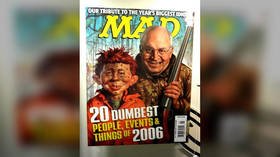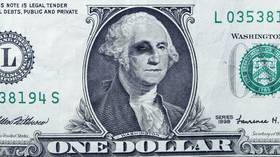‘End of humor without PC’: MAD magazine cancels new content after 67 years of political satire

MAD magazine will no longer publish new content and the 67-year-old political humor and satire outlet won’t be sold on newsstands, prompting its fans to decry the end of an era as the anti-authority publication bites the dust.
The influential cult comic book and later magazine was launched in 1952, thrilling a generation with its sharp observations and ridiculing of US culture, politics and the media. In its heyday in the 70s, its circulation was 2 million as readers relished its jabs at advertising, hippies, and politicians, spearing both Republicans and Democrats in equal measure. It’s credited with teaching young people how to be skeptical of government and the media, and its longtime fans mourned the end of an era on social media on Thursday, sharing their favorite covers.
— Jimmy (@JMonoshiri) July 4, 2019
MAD Magazine cover from June 2017......as fresh today as the day it was published....... pic.twitter.com/l4Igvhv3T3
— mike martin (@mikecannytalk) July 3, 2019
@Petedavis1@RealJamesWoods once again MAD Magazine proves to be the throat punch to PC Culture pic.twitter.com/tkfpEMM4kf
— Joel Gonzalez (@Synphal) November 5, 2018
Fans are pointing the finger of blame for the publication’s demise on the current PC-obsessed culture which cries foul over dark comedy and alternative viewpoints, marking this moment as the “end of humor without political correctness” and noting that MAD was “too dark and smart for the Twitter era.” Magazines like MAD just can’t whip up the same instant frenzy as social media in this cancel-culture age, and as a result “parody is dead.”
It was doomed with the rise of political correctness
— Tim Henry (@melaexec) July 4, 2019
MAD’s circulation steadily fell over the years as its popularity was upstaged by the likes of The Simpsons, The Onion, late night television and the endless alternative content online. Contributor Al Jaffee explained in 2010 that the people who grew up reading MAD were now working on late night shows like Saturday Night Live and Stephen Colbert, “So MAD is almost in a competition with itself.”
In 2001, it began accepting advertising for the first time and relaunched in 2017 after moving from New York to California, without most of its veteran staff. It continued to make sharp observations, with a 2018 four-page comic strip, featuring children who were about to become victims of a school shooting, attracting attention.
Holy shit, Mad Magazine 👏👏👏Pulling no punches. pic.twitter.com/UMTNmb7u9G
— Dɪᴢᴡɪʀᴇ (@dizwire) October 4, 2018
#PrideMonth#Pride2019pic.twitter.com/7qyPJcx03x
— MAD Magazine (@MADmagazine) June 6, 2019
#WednesdayThoughts re: the #NotreDameCathedralFirepic.twitter.com/Gl4Hd7GriZ
— MAD Magazine (@MADmagazine) April 17, 2019
MAD’s ceasing of new content production comes as political cartoons experience a fall in popularity across the board, particularly in newspapers, said to be as a result of publications not wanting to offend their audiences. The New York Times announced in June it was cutting all political cartoons after an illustration sparked accusations of anti-Semitism, while Canadian cartoonist Michael de Adder claimed he was fired by Brunswick News Inc after he created a viral cartoon featuring Donald Trump and a dead migrant.
Also on rt.com Are political cartoons next for the axe as newspapers worry more about ‘offending’ readers?Like this story? Share it with a friend!














